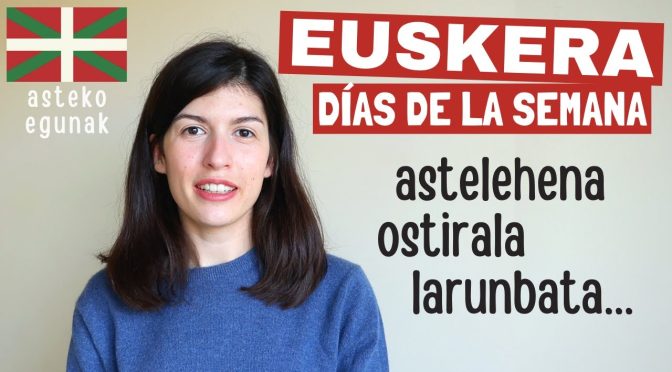When we think about what we call the days of the week, how many of us think about the fact that Monday is named after the moon, Wednesday is Odin’s day, and Thursday is dedicated to the Scandinavian god Thor? Where do these names even come from? They’re just names, and we’ve lost, for the most part, our connection to their meaning. When I was learning Euskara, I couldn’t help but think about what the names meant. Just like me with English, do native Basque speakers not think about what these words mean when they say them? Are they just words now, divorced from their origins? Basque, as you might expect, has very different names for the days of the week, starting with the idea that the Basque week may have originally been only three days long.

- In Batua Basque, the first three days of the week — Monday, Tuesday and Wednesday — are astelehen, astearte, and asteazken. These literally mean “the beginning of the week,” “the middle of the week,” and “the end of the week.” Many have interpreted this to mean that Basque originally had a three-day week. However, if this were to be true, Basques would be about the only culture to ever have had a three-day week. And linguist Larry Trask doubted that these words are very old, casting some doubt that they are related to an ancient three-day week. However, we have no other idea of where they came from.
- That said, different dialects have other names for these days. In Bizkaian, Monday is called ilen, which is now thought to derive from il-egun, or “moon-day,” so very similar in spirit to English’s Monday. Similarly, Tuesday is martitzen, which comes from martitz-egun, and is the day dedicated to the god Mars, much like Spanish martes.
- Wednesday is a bit trickier in Bizkaian. The name, eguasten, begins with the word egun, meaning day, but the ending is less clear. Thursday is eguen, which seems to derive from egun-egun, or “day-day.” Similarly, eguasten might comes from egun-aste-egun, or “day-week-day,” but what this means isn’t clear. It may also mean “last day,” similar to “end of the week.”
- In Batua, Thursday is ostegun, or the day of or(t)zi/ortze/osti, depending on the dialect. The meaning of ortzi/ortze/osti is not completely clear, but seems to be related to sky, storm, or thunder, provoking parallels with Thursday (Thor’s-day) or jueves (Jupiter’s day). This has led some to speculate that ortzi might be an ancient name for a Basque god of thunder. However, some have suggested that this could come from bortz-egun, meaning the “fifth day,” which might make sense if one starts counting on Sunday.
- The Batua word for Friday is ostiral, with that same root, though what the ending might mean is unclear. In Bizkaian, Friday is bari(a)ku, which comes from abari-ba(gari)ko-egun, meaning “day without dinner,” which makes sense since Friday was a fast day.
- The names for Saturday are intriguing. In Batua, it is larunbat, which maybe comes from laurden bat, meaning “one quarter,” and referring to the fact that a week is one quarter of the lunar cycle. However, others derive it from lagunen bate, which would translate to something like “meeting of friends.” In some parts of Iparralde, they call Saturday neskanegun, literally meaning “girl’s day.” Henrike Knörr notes that “it used to be customary in some parts of the Basque Country for boys to go and spend the evening at their girlfriend’s house and have dinner which the girlfriend would prepare,” maybe explaining this last variant.
- In Bizkaian, Saturday is zapatu, borrowed from the Latin word for the Sabbath. The word egubakoitz is also used in Bizkaian and other dialects to mean either Friday or Saturday. It seems this word might mean “unique day,” but where it comes from is unknown.
- Finally, Sunday is igande in Batua. Some relate this to igan, the Basque word for “ascend,” connecting igande to the day of the ascension. The Bizkaian word for Sunday is more transparent: domeka comes from the Latin <(dies> dominica> or “(day) of the Lord.”
Primary sources: Days and Months in Euskara by Larry Trask; Etymological Dictionary of Basque by R. L. Trask
Discover more from Buber's Basque Page
Subscribe to get the latest posts sent to your email.



Eguasten means the same as azkenegun. -asten is only a variant of azken.
Thanks! I guess Larry wasn’t so sure – I took my descriptions from him. But, it is good to have other views on this.